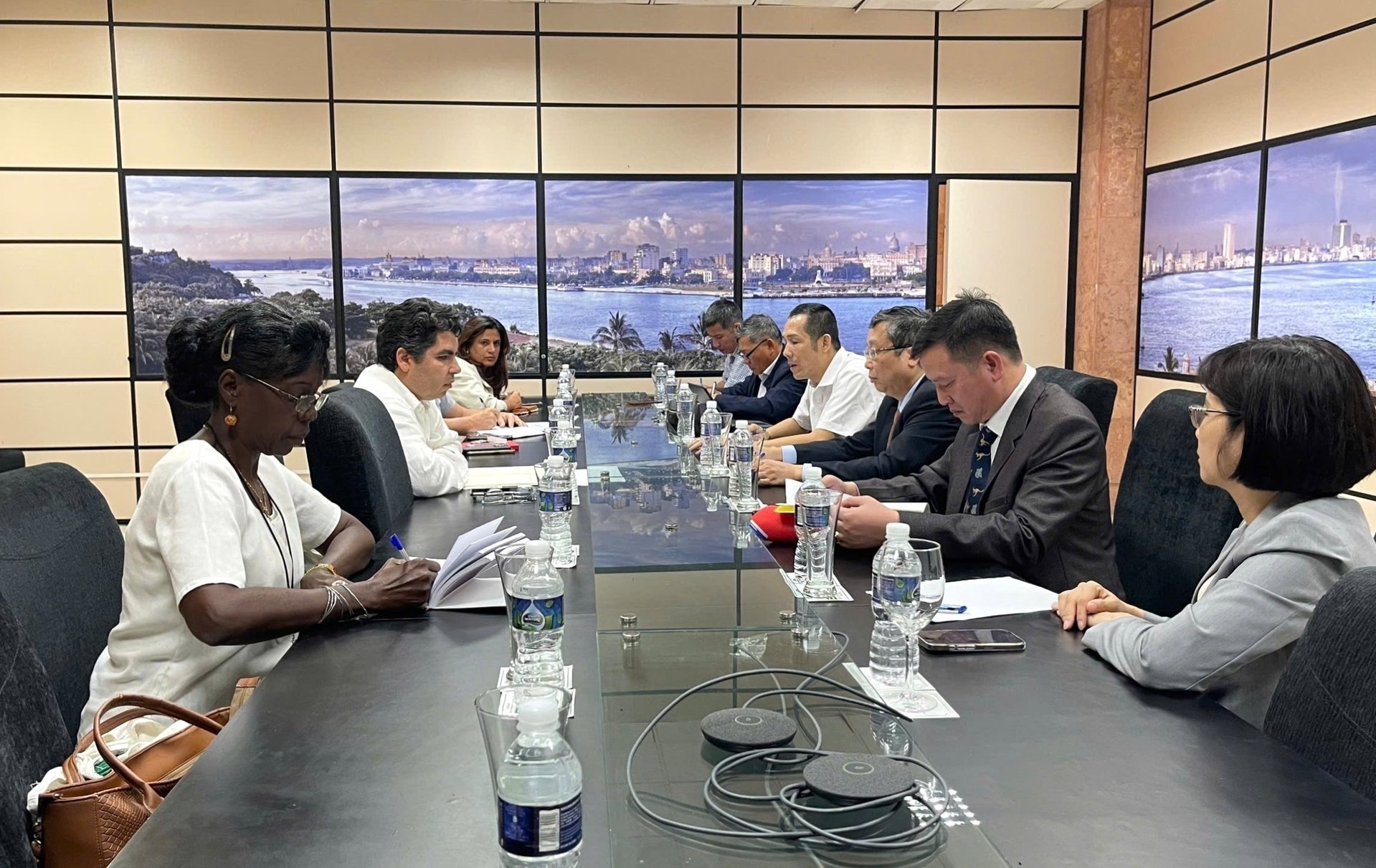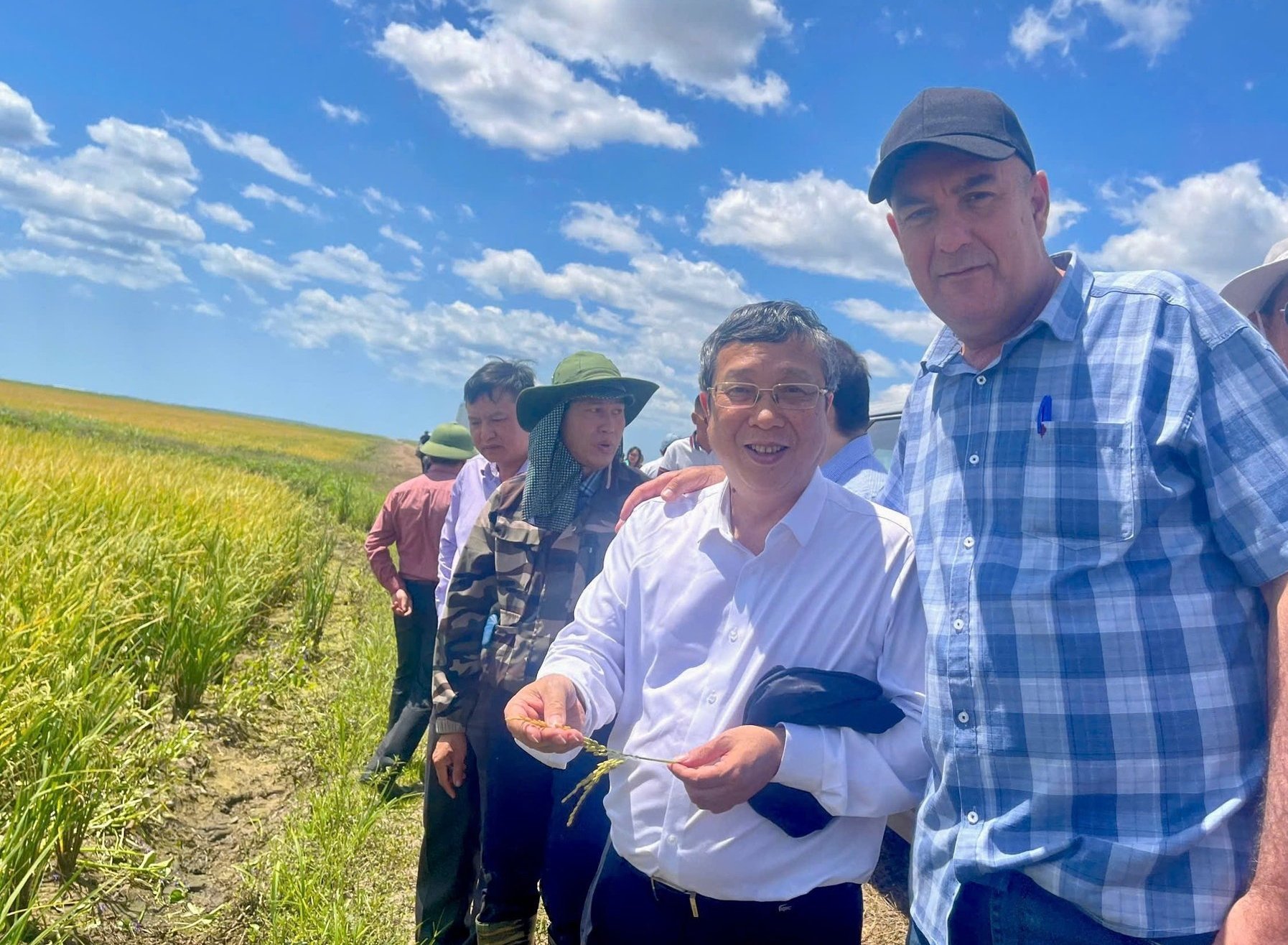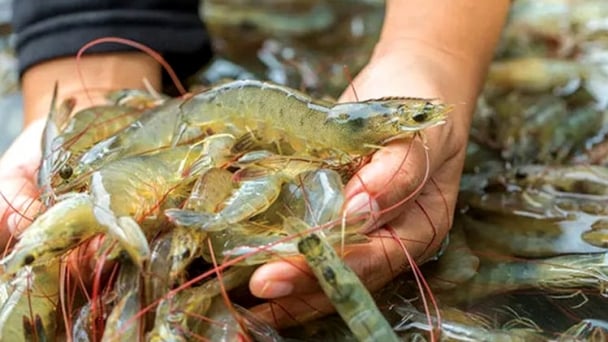May 23, 2025 | 22:20 GMT +7
May 23, 2025 | 22:20 GMT +7
Hotline: 0913.378.918
May 23, 2025 | 22:20 GMT +7
Hotline: 0913.378.918
During the working trip of the Government of Vietnam (from April 11-14, 2025), the Deputy Minister of Agriculture and Environment had a bilateral meeting with Mr. Telce González Morera, Deputy Minister of Agriculture of Cuba, and visited a rice production farm in Pinar del Río Province together with Mr. Ydael Pérez Brito, Minister of Agriculture of Cuba.
Vietnam and Cuba are currently implementing three technical cooperation projects, including: the Vietnam-Cuba technical cooperation project on rice production development phase 5 (2019-2025); the aquaculture cooperation project in Cuba; and the maize production cooperation project in Cuba.
During the working session, Deputy Minister Hoang Trung shared that the Vietnam-Cuba technical cooperation project on rice production development phase 5 (2019-2025) has been fundamentally completed and has achieved its set objectives. In addition, the cooperation projects on maize production and aquaculture have also recorded positive outcomes.

A working delegation from the Ministry of Agriculture and Environment of Vietnam, led by Deputy Minister Hoang Trung, held a meeting with the Ministry of Agriculture of Cuba. Photo: ICD.
Based on the practical implementation of the project, Deputy Minister Hoang Trung expressed his hope that Cuba will gradually improve its productivity and increase domestic rice production. At the same time, he affirmed that Ministry of Agriculture and Environment will continue to direct the Vietnam Academy of Agricultural Sciences (VAAS) to provide technical support, guide the restoration and rapid multiplication of rice varieties at different levels, contributing to the expansion of rice production in Cuba in the near future.
Deputy Minister Hoang Trung emphasized that Vietnam will continue to provide guidance to ensure that by the end of this year, marking the completion of Phase 5, Cuba will be fully equipped to receive all outcomes, technical procedures, rice variety packages, and infrastructure needed to scale up production.
On the Cuban side, Deputy Minister of Agriculture Telce González Morera expressed gratitude to the Ministry of Agriculture and Environment of Vietnam for its consistent companionship, technical support, and effective resource assistance throughout the project’s implementation. He noted that these efforts have strengthened the effective cooperative relationship and the enduring solidarity between the two countries.
The two Deputy Ministers agreed to organize a final review of Phase 5 of the Vietnam-Cuba technical cooperation project on rice production development by the end of 2025. They also committed to working closely together to complete a comprehensive report summarizing 20 years of technical cooperation in rice production between Vietnam and Cuba.

Deputy Minister Hoang Trung and the Minister of Agriculture of Cuba visited a farm in Pinar del Río province. Photo: ICD.
To materialize the results of rice production cooperation, Cuban Minister of Agriculture Ydael Pérez Brito welcomed Deputy Minister Hoang Trung for a field visit to a farm in Los Palacios district, Pinar del Río province, Cuba.
The visit took place at the peak of the rice harvest season, as the 1,000-hectare rice field invested and cultivated by Agri VMA Co., Ltd. was preparing for harvest. The pilot results of Vietnamese hybrid rice cultivation demonstrated an average yield of approximately 7 tons per hectare, three times higher than previous yields.
Minister Ydael Pérez Brito shared: “The Cuban people find Vietnamese rice to be fragrant, delicious, and of high quality. We hope to maintain continuous and staggered rice production cycles to ensure stability and sustainability for our domestic rice sector.”
With favorable weather conditions and planting techniques transferred by the Vietnamese side, the current crop is expected to yield further promising results.
The Vietnamese side proposed that the next steps require close and comprehensive cooperation between the two Ministries to help Cuba expand production, improve cost efficiency, and gradually achieve food security.
Pinar del Río is a province in the western part of Cuba, covering a natural area of 881,335 hectares. The agricultural land area is 416,716 hectares, with a population of approximately 580,000 people.
The province has a potential rice cultivation area of 44,000.5 hectares. However, due to various production conditions, the cultivated rice area in recent years has been around 29,000 hectares, spread across 6 districts (Los Palacios, La Palma, Pinar del Río, Mantua, Consulacion de Sur, and Minas).
Located in a tropical climate zone, Pinar del Río experiences distinct seasons: a dry season from November to April and a rainy season from May to October.
Translated by Kieu Chi

(VAN) WWF, GIZ, IUCN, UNDP call for biodiversity conservation and sustainable development must be regarded as a unity in strategies for a green future.

(VAN) On celebration of International Day for Biological Diversity, Deputy Minister Nguyen Quoc Tri called for practical actions to address nature and biodiversity conservation.

(VAN) Dr. Hoang Thi Thanh Nhan – Deputy Director of the Nature and Biodiversity Conservation Agency – highlighted this on the International Day for Biological Diversity, May 22, 2025.
![Ho Chi Minh city adapts to climate change: [2] Accelerating action](https://t.ex-cdn.com/nongnghiepmoitruong.vn/608w/files/chiqk/2025/05/22/4024-4220-bien-doi-khi-hau-1-100626_766.jpg)
(VAN) Clearly recognizing the challenges posed by climate change, Ho Chi Minh city has swiftly shaped its policies and implemented practical solutions to adapt.

(VAN) Rice straw is no longer just a discarded byproduct, but it is becoming a green resource that helps farmers in the Mekong Delta reduce emissions and promote circular, sustainable agriculture.

(VAN) Other Effective Area-based Conservation Measures (OECMs) are solutions that contribute effectively to achieving the goals of the Kunming–Montreal Global Biodiversity Framework.

(VAN) A study assessing the carbon footprint of whiteleg shrimp farming in China shows the potential for carbon emission reduction through the use of renewable energy.